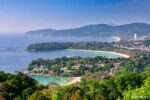Traveling to countries with hot tropical climates offers an array of breathtaking experiences, from stunning beaches to lush rainforests and vibrant local cultures. However, the intense heat and humidity can pose challenges for even the most seasoned travelers. To ensure your trip is both enjoyable and safe, it’s important to be well-prepared and mindful of the unique conditions you’ll encounter in these regions. Here are some essential tips to help you navigate your tropical adventure.
Stay Hydrated
One of the most crucial aspects of traveling in hot tropical climates is staying properly hydrated. The combination of high temperatures and humidity can lead to excessive sweating, which can quickly deplete your body’s water reserves. Make a habit of drinking water regularly throughout the day, even if you don’t feel thirsty. Carry a reusable water bottle with you and refill it whenever possible. Consider adding electrolyte tablets to your water to help replenish lost minerals. Avoid drinking tap water unless it’s been purified, and be cautious with ice in drinks. Opt for bottled water, especially in regions where water quality is questionable. Additionally, consuming fruits with high water content, like watermelon and oranges, can contribute to your hydration efforts.
Dress Appropriately
Choosing the right clothing can make a significant difference in your comfort level while traveling in the tropics. Opt for lightweight, breathable fabrics such as cotton or linen, which allow air to circulate and help wick away sweat. Loose-fitting clothing is preferable as it promotes better air circulation around your body. Light-colored clothes reflect sunlight and keep you cooler than darker shades. Don’t forget to pack a wide-brimmed hat and sunglasses to protect your face and eyes from the intense sun. Footwear should also be considered; breathable shoes or sandals can help keep your feet cool and comfortable. Additionally, packing a lightweight scarf or shawl can be useful for covering up when entering religious sites or to provide extra sun protection.
Sun Protection
The sun’s rays are much stronger in tropical regions, so protecting your skin is essential. Apply a high-SPF sunscreen generously to all exposed skin, and reapply it every two hours or after swimming or sweating. Consider wearing UV-protective clothing for additional sun protection. Seek shade during the peak sun hours, typically between 10 a.m. and 4 p.m., to minimize direct sun exposure. A portable umbrella or a lightweight sunshade can also provide much-needed relief when you’re on the go. Don’t forget lip balm with SPF to protect your lips, and always carry after-sun lotion or aloe vera gel to soothe your skin if you do get sunburned.
Adapt to the Local Pace
In hot tropical climates, it’s important to adjust your activities to the local rhythm, often referred to as “island time.” This slower pace allows you to avoid overexertion during the hottest parts of the day. Plan your outdoor activities, such as sightseeing or hiking, for early mornings or late afternoons when temperatures are more moderate. Use the midday hours to relax, enjoy a leisurely meal, or take a siesta. Embracing this relaxed approach will help you conserve energy and stay cool. Additionally, this is a great time to indulge in local indoor activities, such as visiting museums, art galleries, or local markets, which can offer a reprieve from the heat while enriching your cultural experience.
Stay Cool and Comfortable
Finding ways to stay cool is key to enjoying your tropical travels. Whenever possible, seek out air-conditioned accommodations and transport options. Many hotels and guesthouses offer rooms with ceiling fans or air conditioning, which can provide a welcome respite from the heat. When exploring outdoors, take advantage of natural cooling spots like shaded parks, rivers, or coastal breezes. Cooling towels or misting fans can also provide quick relief from the heat when you’re on the move. Consider taking regular dips in the sea or a pool to cool off, and make sure to dry off thoroughly to avoid any potential skin issues from prolonged dampness.
Mind Your Health
Traveling in hot tropical climates can sometimes lead to health issues such as heat exhaustion or heatstroke. Be aware of the signs of these conditions, which include dizziness, nausea, rapid heartbeat, and confusion. If you experience any of these symptoms, find a cool place to rest and hydrate immediately. It’s also wise to carry a basic first aid kit that includes rehydration salts, pain relievers, and any personal medications you might need. Remember to eat light meals rich in fruits and vegetables to stay nourished and hydrated. Moreover, ensure you have received any necessary vaccinations or medications for tropical diseases, such as malaria or dengue fever, before your trip.
Interact Responsibly with Wildlife
Tropical destinations are often home to diverse and fascinating wildlife, from monkeys and birds to marine creatures. While it can be tempting to get up close and personal with these animals, it’s important to interact responsibly and safely. Avoid feeding wildlife, as this can disrupt their natural behaviors and lead to health problems for the animals. When snorkeling or diving, be mindful of coral reefs and marine life, and avoid touching or disturbing them. Using reef-safe sunscreen can help protect delicate marine ecosystems from harmful chemicals. Always follow local guidelines and regulations regarding wildlife interactions to ensure both your safety and the well-being of the animals.
Stay Informed About Local Conditions
Before and during your trip, stay informed about local weather conditions and any potential hazards. Tropical climates can be prone to sudden storms, heavy rainfall, and even hurricanes or typhoons. Keep an eye on weather forecasts and heed any warnings or advisories issued by local authorities. Familiarize yourself with the location of medical facilities, embassies, and emergency contacts in case you need assistance. Being well-prepared and informed can help you navigate unexpected situations more smoothly. Additionally, understanding local customs and etiquette can prevent misunderstandings and enhance your overall travel experience.
Embrace the Local Culture
Finally, one of the most rewarding aspects of traveling in hot tropical climates is the opportunity to immerse yourself in vibrant local cultures. Take the time to learn about the customs, traditions, and languages of the places you visit. Engage with local communities, sample traditional cuisine, and participate in cultural activities. This not only enriches your travel experience but also fosters mutual respect and understanding between you and the local residents. Attending local festivals or events can provide deep insights into the cultural fabric of the region, making your trip even more memorable.
Traveling in hot tropical climates can be an unforgettable adventure filled with stunning natural beauty and cultural richness. By taking the necessary precautions and embracing the unique pace and environment of these regions, you can ensure a safe, comfortable, and deeply rewarding journey.





